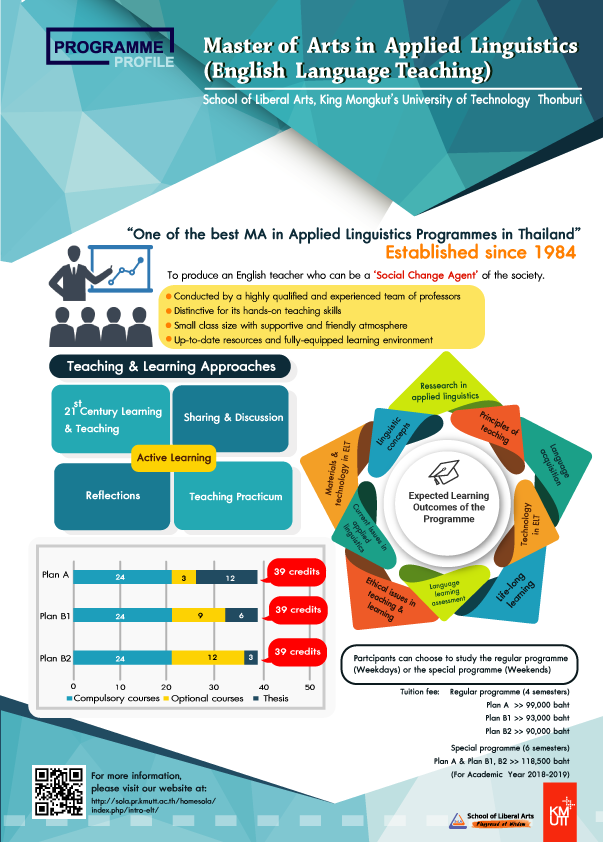Introduction
Degree
Master of Arts (Applied Linguistics for English Language Teaching)
Offered by
Department of Language Studies School of Liberal Arts
King Mongkut’s University of Technology Thonburi
This MA programme is designed to help teachers and potential teachers gain the understanding and skills necessary to continue their professional growth and to adapt to the changing demands of language teaching/learning in Thailand today. Consequently, since its start in 1984, the course is suitable for people interested in teaching and teachers working in ELT settings of tertiary, vocational and secondary levels.
Both weekday and weekend MA in ELT programme aims to:
- prepare the participants to be effective teachers
- improve the participants’ understanding of and practical ability in classroom teaching
- raise their level of professional skills as organizers and innovators, inside and outside the classroom
- provide a practical understanding of the roles of linguistics & psychology in the teaching-learning process
- provide training in the use of practical educational research techniques appropriate to the promotion of effective teaching and learning
- give training in undertaking an extended practical project involving the application of the principles and techniques studied in the curriculum.
- improve their English language and study skills
Full time staff
| Name | Major | Research area |
| Asst. Prof. Dr. Wareesiri Singhasiri | Applied Linguistics (2001, University of Essex, U.K.) | Research methodology in ELT, learning strategies, learning styles and self-directed learning |
| Asst. Prof. Dr. Atipat Boonmoh | Applied Linguistics (2009, University of Warwick, U.K.) | Dictionary use, lexicography, autonomy, new technologies and language learning |
| Asst. Prof. Dr. Natjiree Jaturapitakkul | English as an International Language (2008, Chulalongkorn University, Thailand) | Language assessment, standardized test development, ESP testing, language learning and teaching |
| Assoc. Prof. Sonthida Keyuravong | Curriculum and Instruction (1981, University of Kansas, U.S.A.) | Self-access learningTechnology in language learning and teachingCourse design and materials development |
| Assoc. Prof. Dr. Pornapit Darasawang | TESOL (2000, University of Edinburgh, U.K.) | Learner autonomy, self-access learning |
| Assoc. Prof. Dr. Richard Watson Todd | English Language Studies (2003, University of Liverpool, U.K.) | Discourse analysis, educational innovation |
| Asst. Prof. Dr. Saowaluck Thepsuriwong | Applied Linguistics (2000, University of Reading, U.K.) | Reading strategies, ELT |
| Asst. Prof. Dr. Pamararat Wiriyakarun | English as an International Language (2007, Chulalongkorn University, Thailand) | Curriculum development, program evaluation, task-based learning, learning strategies and learner autonomy |
| Dr. Hayo Reinders | Applied Language Studies & Linguistics (2005, University of Auckland, New Zealand) | The role of technology in learning and teaching, learner autonomy, self-access, task-based language teaching, language processing (attention and noticing), mobile learning |
| Dr. Phanitphim Sojisirikul | English Language Studies (2009, Suranaree University of Technology, Thailand) | Approaches and methodologies, Course and curriculum development, Information and communication technology (ICT) in language teaching, English language testing |
| Asst. Prof. Dr. Wannapa Trakulkasemsuk | English as an International Language (2008, Chulalongkorn University, Thailand) | World Englishes, English as a Lingua Franca, language and communication |
| Asst. Prof. Dr. Woravut Jaroongkhongdach | Applied Linguistics (2012, King Mongkut’s University of Technology Thonburi, Thailand)Applied Linguistics (2012, Macquarie University, Australia) | Written discourse, Research writing |
| Dr. Kitcha Thepsiri | Educational and Applied Linguistics (2006, Newcastle University, U.K.) | Socio-cultural Perspectives including Task-based and Project-based Learning, Attribution and Motivation, Teaching and Learning Strategies |
Teaching Staff
| Name | Major | Research area |
| Dr. Ornkanya Yaoharee | Cultural Perspectives and Comparative Education (2013, University of California, Santa Barbara, U.S.A) | pragmaticsintercultural communicationinternationalizationEnglish in workplace communication |
| Dr. Punyapa Saengsri | English as an International Language(2008, Chulalongkorn University, Thailand) | Assessment and Evaluation Information in ELT and communication technology (ICT) in language teaching, |
Part-time Staff
| Name | Major | Research area |
| Dr. Stephen Louw | Applied Linguistics (2014, King Mongkut’s University of Technology Thonburi, Thailand) | Language Teacher Education |
| Dr. Kittinata Rhekhalilit | Linguistics (2014, Chulalongkorn University, Thailand) | Syntax, Sociolinguistics, Language Change &Variation, and Linguistic Landscape |
Admission

Applicants must hold a Bachelor’s degree in any field from an accredited academic institution.
To assess applicants’ English, they can either take the KMUTT internal language proficiency test, or produce evidence of having achieved the following IELTS, TOEFL scores.
| IELTS | TOEFL IBT |
| 6 | 78 |
Suitable applicants with insufficient English are required to take a non-credit English Language Improvement course.
Selection is based on two aspects: written exam and interview. The Admissions Committee’s carefully evaluate the applicants’ written exam, academic history, English Proficiency Test results, recommendations, interviews, and commitment to completion of the program.
Admissions Schedule for Thai students (within June 30, 2022) : Available on April 11, 2022
Admissions Schedule for International students (within June 12, 2022) : Available on April 11, 2022
The admissions schedule is for the ELT weekday programme and the ELT weekend programme are separated i.e.
- The weekday programme starts in the first semester of any academic year (around August)
- The weekend programme starts in the second semester of any academic year (around January).
Applicants are strongly encouraged to submit their applications before each round deadline.
Study Plans

This programme is either for weekday study or weekend study (2 years), and the courses are conducted in English. Classes are normally scheduled from 9.00 to 16.00.
The applicants can choose either of the three study plans: Plan A (12 credit thesis) and Plan B (6 credit research), and Plan B (3 credit independent study). Both plans consist of the following components:
| Plan A (12 credit thesis) | |
| Compulsory courses | 24 Credits |
| Elective courses | 3 Credits |
| Thesis | 12 Credits |
| Total | 39 Credits |
| Plan B (6 credit research) | |
| Compulsory courses | 24 Credits |
| Elective courses | 9 Credits |
| Thesis | 6 Credits |
| Total | 39 Credits |
| Plan B (3 credit independent study) | |
| Compulsory courses | 24 Credits |
| Elective courses | 12 Credits |
| Thesis | 3 Credits |
| Total | 39 Credits |
This programme is either for weekday study or weekend study (2 years), and the courses are conducted in English. Classes are normally scheduled from 9.00 to 16.00.
The applicants can choose either of the three study plans: Plan A (12 credit thesis) and Plan B (6 credit research), and Plan B (3 credit independent study). Both plans consist of the following components:
| Plan A (12 credit thesis) | |
| Compulsory courses | 24 Credits |
| Elective courses | 3 Credits |
| Thesis | 12 Credits |
| Total | 39 Credits |
| Plan B (6 credit research) | |
| Compulsory courses | 24 Credits |
| Elective courses | 9 Credits |
| Thesis | 6 Credits |
| Total | 39 Credits |
| Plan B (3 credit independent study) | |
| Compulsory courses | 24 Credits |
| Elective courses | 12 Credits |
| Thesis | 3 Credits |
| Total | 39 Credits |
Curriculum

- Foundation Courses
ELT 600 ทักษะภาษาอังกฤษเชิงวิชาการ 3(3-0-9) (S/U)
(Academic English Language Skills)
Pre-requisite : None
การอ่าน: ใจความสำคัญ ข้อมูลรายละเอียดจากเรื่อง การประเมินความน่าเชื่อถือของข้อมูล การเขียน: การประเมินความน่าเชื่อถือของแหล่งข้อมูล การเขียนโครงร่าง การเขียนความเรียงเชิงสาธก การโจรกรรมทางวรรณกรรม การเขียนอ้างอิง การเขียนบรรณานุกรม ทักษะการนำเสนองาน: การใช้สื่อต่างๆประกอบการนำเสนองาน สำนวนที่ใช้ในการนำเสนองาน ภาษาท่าทางในการนำเสนองาน การอภิปราย: การเห็นด้วย การไม่เห็นด้วย
Reading skills: main ideas, supporting details, criticism the reliability of text. Writing skills: researching, evaluating sources, outlining, argumentative essays, plagiarism, citation, reference. Presentation skills: visual aids, expressions, non-verbal languages. Discussion: agreement, disagreement.
Learning outcomes:
- Identify main ideas and supporting details of various academic texts.
- Criticize the reliability of the academic text.
- Express an argument and give supporting reasons in writing.
- Incorporate citations and references into your academic argumentative writing.
- Use academic language in giving presentation and discussion.
- Compulsory courses
ELT 601 ภาษาศาสตร์สำหรับครูผู้สอนภาษาอังกฤษ 3(3-0-9)
(Linguistics for English Language Teachers)
Pre-requisite : None
ขอบเขตของภาษาศาสตร์ ธรรมชาติภาษาของมนุษย์ แนวคิดหลักทางภาษาศาสตร์สำหรับครู (สัทวิทยา สัทศาสตร์ สัณฐานวิทยา วากยสัมพันธ์ อรรถศาสตร์ วัจนปฏิบัติศาสตร์) ความรู้ทางภาษาอังกฤษสำหรับครู (คำศัพท์เฉพาะทาง การรู้ภาษาและการใช้ภาษา ไวยากรณ์หน้าที่ ไวยากรณ์ในการสอน) การวิเคราะห์ประโยค การสำรวจภาษาและไวยากรณ์
Scope of linguistics. Nature of human language. Major linguistic concepts for language teachers (Phonetics and phonology, morphology, syntax, semantics and pragmatics). English Language knowledge for teachers (Language terminology, language use and usage, functional grammar,pedagogical grammar.) Sentence analysis. Language and grammar exploration.
Learning outcomes:
- Understand English language features.
- Identify English language elements.
- Analyze English language features and elements.
- Compare and contrast English language features with those of Thai.
- Apply the knowledge of English language features in teaching English as a foreign language.
ELT 611 หลักการและการสอนทางภาษาอังกฤษ1 3(3-0-9)
(Principles and Practices in Language Teaching)
Pre-requisite : None
วัตถุประสงค์ของการสอน ความเชื่อและปัจจัยที่มีผลต่อการสอน นโยบายการศึกษาของประเทศไทย การสอนและการเรียนรู้ในศตวรรษที่ 21 บทบาทและจริยธรรมของครู บทบาทของผู้เรียน รูปแบบการสอน ขั้นตอนการสอนและการเชื่อมโยงบทเรียน การวางแผนการสอน และแผนการสอนระยะยาว กลยุทธ์การอ่านและการตีความบทเรียน การสอนคำศัพท์และชนิดของกิจกรรม การสอนการอ่าน การฝึกสอนการอ่าน กลยุทธ์การฟังและการตีความบทเรียน การสอนคำศัพท์และชนิดของกิจกรรม การสอนการฟัง การฝึกสอนการฟัง
Objectives of teaching. Beliefs and factors influencing teaching. Educational policy in Thailand. 21st Century of language learning and teaching. Roles and ethics of teachers. Roles of learners. Paradigms in teaching. Stages in a lesson and transitions. Lesson planning and long term planning. Reading strategies and material interpretation. Vocabulary and activity types on reading. How to teach reading. Practice teaching reading. Peer teaching on reading. Listening strategies and material interpretation. Vocabulary and activity types on listening. How to teach listening. Practice teaching listening. Peer teaching on listening.
Learning outcomes:
- Have a clear understanding of the principles of teaching and the purposes of and techniques for teaching reading and listening.
- Develop lesson plans that involve students in an active learning environment.
- Have the practical ability necessary to handle a range of core teaching techniques relating to the teaching of reading and listening.
- Monitor and reflect on the students’ own peer-teaching as well as give feedback to peers on the peer-teaching and micro-teaching.
ELT 612 หลักการและการสอนทางภาษาอังกฤษ 2 3(3-0-9)
(Principles of Practices in Language Teaching II)
Pre-requisite : ELT 611 Principles of Practices in Language Teaching I
กลยุทธ์การสอนที่มีประสิทธิภาพ กลยุทธและกระบวนการในการเขียน กิจกรรมการเขียน การสอนเขียน การฝึกปฏิบัติการสอนเขียน การให้ข้มูลย้อนกลับสำหรับงานเขียน การทดลองสอนการเขียน กลยุทธ์การพูด กิจกรรมการพูด การสอนพูด การฝึกปฏิบัติการสอนพูด การให้ข้อมูลย้อนกลับและการแก้ไขข้อผิดพลาดในการพูด การฝึกการสอนพูด
Effective teaching strategies. Writing processes and strategies. Activity types for writing. How to teach writing. Practice teaching writing. How to give feedback for writing. Micro teaching for writing. Speaking strategies. Activity types for speaking. How to teach speaking. Practice teaching speaking. How to give feedback and error treatment for speaking. Micro teaching on speaking.
Learning outcomes:
- Have a clear understanding of the purposes of and techniques for teaching writing and speaking.
- Develop lesson plans that involve students in an active learning environment.
- Have the practical ability necessary to handle a range of core teaching techniques relating to the teaching of writing and speaking.
- Read academic articles relating to the teaching of writing and Speaking and critically analyze their strengths and weaknesses as well as discuss how the ideas in the articles can be implemented in the students’ teaching situation.
- Monitor and reflect on the students’ own peer-teaching and micro-teaching as well as give feedback to peers on the peer-teaching and micro-teaching.
ELT 613 เทคนิคการสอนในภาคปฏิบัติ 3(1-4-9)
(Teaching Techniques in Practice)
Pre-requisite : ELT 611 Principles of Practices in Language Teaching I
ELT 612 Principles of Practices in Language Teaching II
การเตรียมการสอน การลงปฏิบัติสอน การประกันคุณภาพการเรียนการสอน การให้คำปรึกษาและให้ข้อคิดเห็นจากอาจารย์นิเทศก์การสะท้อนความคิดของการลงปฏิบัติสอนของผู้สอนและการประเมินตนเองของผู้สอนPreparation for teaching. Implementation of teaching and learning. Quality assurance of teaching and learning, Supervision and feedback of the teaching. Reflections on teaching performance and self-evaluation.
Learning outcomes:
- Apply the principles of teaching into practices.
- Create appropriate lesson plan and use them effectively.
- Creatively design and create meaningful activities and materials.
- Monitor and reflect their own teaching as well as give feedback to their co-teachers.
- Understand the roles of being a good English language teacher.
- Be a good model of a good language learner.
ELT 620 มุมมองทางด้านภาษาศาสตร์ประยุกต์และการสอนภาษาอังกฤษ 3(3-0-9)
(Perspectives in Applied Linguistics and English Language Teaching)
Pre-requisite : None
ภาษาศาสตร์ ภาษาศาสตร์ประยุกต์และการสอนภาษาอังกฤษ มุมมองเชิงประวัติศาสตร์ด้านพัฒนาการของทฤษฎีทางภาษาและอิทธิพลที่มีต่อการสอนภาษา มุมมองเกี่ยวกับภาษาในเชิงภาษาศาสตร์สังคม ความหลากหลายทางภาษา หลักสูตรที่เน้นหัวเรื่องและหน้าที่ของภาษา ภาษาอังกฤษเพื่อวัตถุประสงค์เฉพาะทาง การสอนภาษาแบบเน้นการสื่อสาร ทฤษฎีทางภาษาด้านสัมพันธสารวิเคราะห์และอิทธิพลที่มีต่อการสอนภาษา
Linguistics, applied linguistics and English language teaching. Historical perspectives and their influences on language teaching. Sociolinguistic views of language. Language variation. Notional-functional syllabus. English for specific purposes. Communicative language teaching. Discourse and genre-based language descriptions and the influences on language teaching.
Learning outcomes:
- Explain the main features of major linguistic descriptions.
- Analyze the strengths and drawbacks of major linguistic descriptions.
- Illustrate the influences of linguistics descriptions on English language teaching.
- Critically evaluate the implications and applications of relevant teaching methodologies.
- Explain language phenomena and make judgment on what and how to teach.
ELT 621 ทฤษฎีการเรียนรู้ภาษา 3(3-0-9)
(Language Learning Theories)
Pre-requisite : None
แนวคิดพื้นฐานเรื่องการเรียนรู้ บริบทของการเรียนรู้ การเรียนรู้ภาษาที่หนึ่งและภาษาที่สอง ทฤษฎีการเรียนรู้ (พฤติกรรมนิยม จิตวิทยาเชิงปริชาน การเรียนรู้เชิงสร้างสรรค์ด้วยปัญญา การเรียนรู้เชิงปฏิสัมพันธ์ การเรียนรู้ตามแนวคิดมนุษยนิยม การเรียนรู้ผ่านการปฏิบัติ (การเรียนรู้ด้วยการค้นพบ การเรียนรู้ผ่านโครงงานและการแก้ปัญหา การเรียนรู้จากการสะท้อนกลับ) ทักษะการคิด ความจำ ความเข้าใจ โครงสร้างทางความรู้ ปัจจัยด้านอารมณ์ แรงจูงใจ ความแตกต่างระหว่างบุคคล รูปแบบและกลยุทธ์การเรียนรู้
Introduction to learning. Learning contexts. First and second language acquisition. Learning theories: behaviorism, cognitive psychology, constructivism, social-interaction theories, humanistic education. Active learning: discovery learning, problem-based learning, project-based learning, task-based learning, reflective learning. Thinking skills. Memory. Comprehension. Schemata. Affects. Motivation. Individual differences. Styles and strategies.
Learning outcomes:
- Explain major learning theories and factors influencing effective language learning.
- Identify learning theories or principles of learning underpinning language learning materials or lssons.
- Explain their own beliefs about learning and analyze cognitive, affective and sociological factors related to their own leaning situations.
- Illustrate applications of language learning theories and create activities to promote active learning.
- Read and analyze research in language learning.
ELT 631 วิธีการทำวิจัยด้านภาษาศาสตร์ประยุกต์ 3(3-0-9)
(Research Methods in Applied Linguistics)
Pre-requisite : None
ความรู้เบื้องต้นเพื่อการวิจัย กระบวนทัศน์การวิจัยและการออกแบบงานวิจัย การวิจัยเชิงปริมาณและเชิงคุณภาพ ข้อควรพิจารณาในการวิจัย ได้แก่ ตัวแปร การเลือกกลุ่มประชากร ความเที่ยงตรงและ ความเชื่อมั่น การกำหนดหัวข้อวิจัย การสร้างกรอบการวิจัย การเก็บรวบรวมข้อมูล เครื่องมือวิจัย คือ แบบสอบถาม การสัมภาษณ์ การสังเกตการณ์ การรายงานทางวาจา การเขียนบันทึก การใช้คลังข้อมูลภาษา และการใช้แบบทดสอบ การวิเคราะห์และการตีความข้อมูลเชิงปริมาณและเชิงคุณภาพ การเขียนโครงร่างวิทยานิพนธ์
Introduction to research. Research paradigms and research designs: quantitative and qualitative approaches. Consideration in doing research: variables, subject selection, reliability and validity. Finding a research topic. Setting up a research framework. Data collecting procedure. Research instruments: questionnaire, interview, observation, verbal reports, diaries, using corpus, and tests. Analysing and interpreting quantitative data. Analysing and interpreting qualitative data. Writing up a research proposal.
Learning outcomes:
- Understand some basic concepts of research and its methodologies
- Describe processes in conducting research
- Assess and critique a published research study
- Design his/her own research methodology
- Write a research proposal
- Be aware of the ethical principles of research, and ethical issues
ELT 661 การทดสอบและการวัดผลทางด้านการเรียนการสอนภาษาอังกฤษ 3(3-0-9)
(Testing and Assessment in English Language Teaching)
Pre-requisite : None
การทดสอบและการประเมินผลเบื้องต้น: คำศัพท์และแนวคิดทางการทดสอบ ข้อควรพิจารณาในการทดสอบ การออกแบบแบบทดสอบ: ขั้นตอนการสร้างแบบทดสอบ ข้อกำหนดของแบบทดสอบ ประเภทของข้อสอบ ข้อสอบแบบปรนัย ข้อสอบแบบอัตนัย การวิเคราะห์ข้อสอบรายข้อ ข้อสอบประเภทอื่นๆ และเกณฑ์การประเมิน การทดสอบไวยากรณ์ การทดสอบคำศัพท์ การทดสอบการพูด การทดสอบการเขียน การทดสอบประสานทักษะ การประเมินผลทางเลือกใหม่ การประเมินอย่างต่อเนื่อง การประเมินตนเอง การทดสอบในรูปแบบคอมพิวเตอร์ ประเด็นและสิ่งที่ควรคำนึงถึงในการทดสอบทางภาษา การออกเกรด การจัดการทดสอบ งานวิจัยในการทดสอบทางภาษา กรอบมาตรฐานความสามารถทางภาษาอังกฤษ ของประเทศในกลุ่มสหภาพยุโรป
Introduction to testing and assessment terms and concepts of testing, key considerations in testing. Designing tests steps in test construction, tables of specifications. Item test types objective test items, subjective test items, item analysis, other item test types and rubrics. Test of grammar. Test of vocabulary. Test of speaking. Test of writing. Global or integrative tests. Alternative assessment continuous assessment, self-assessment, computer-based testing. Broader issues and practical concerns in language testing generating grades, administering tests, research in language testing, Common European Framework of References for Languages (CEFR).
Learning outcomes:
- Define the key terms and apply correctly the key terms and concepts in testing and Evaluation.
- Develop classroom language tests.
- Evaluate test quality.
- Improve poor test items.
- Evaluate the suitability of alternatives to testing.
- Design effective alternatives to testing.
- Elective courses
ELT 622 การเรียนรู้และการเรียนการสอนภาษาแบบพึ่งตนเอง 3(3-0-9)
(Autonomy in Language Learning and Teaching)
Pre-requisite : None
ทฤษฎีพื้นฐานการเรียนรู้ภาษาด้วยตนเอง แรงจูงใจของผู้เรียนที่ส่งเสริมการเรียนรู้แบบพึ่งตนเอง ความแตกต่างของปัจเจกบุคคลในการเรียนรู้และการเปลี่ยนแปลงบทบาทของผู้สอนและผู้เรียน แนวทางการเรียนรู้แบบพึ่งตนเอง ทั้งในและนอกห้องเรียน ความรับผิดชอบและพึ่งพาตนเองในการเรียนรู้ แนวทางการเรียนรู้แบบใช้ทรัพยากร การวิจัยการเรียนรู้และการเรียนการสอนภาษาอังกฤษด้วยตนเอง การก่อตั้งและการบริหารศูนย์การเรียนรู้แบบพึ่งตนเอง
Theoretical underpinnings Language Learner Autonomy. Motivation in favour of Learner Autonomy. Individual and Learners’ Styles. Role Change for Teachers and Learners. Approaches to Fostering Autonomy both inside and outside the classroom. Resource-based Approaches. Learner Development. Research in Autonomy in English Language Learning and Teaching. Establishing and Running a Self-Access Learning Centre.
Learning outcomes:
- Explain theories and concepts that underpin language learner autonomy.
- Analyse theories and approaches that foster autonomous learning.
- Identify and explain teachers and students’ roles in the autonomous learning.
- Implement the concepts of Resourced-based Approaches into practice.
ELT 640 ภาษาในห้องเรียนสำหรับครู 3(3-0-9)
(Classroom Language for Teachers)
Pre-requisite : None
ภาษาในห้องเรียนสำหรับครู: การเปิดห้องเรียน การเกริ่นเข้าสู่บทเรียน การตั้งคำถาม การให้คำอธิบาย การตรวจสอบความเข้าใจ การออกคำสั่ง การให้ข้อมูลย้อนกลับ การแก้ข้อผิดพลาด กลยุทธ์การสอนของครู: การจัดการชั้นเรียน เทคนิคการสอนด้วยการเล่าเรื่อง วิธีการสอนแบบสาธิต การอธิปรายงานวิจัย การประเมินตนเองของครู
Teacher’s language: opening class, eliciting, questioning, giving explanations, checking understanding, giving instructions, giving feedback, and correcting er-rors. Teacher’ strategies: managing class. Teacher’s narratives. Teaching demonstrations. Research discussion. Teacher’s self-assessment.
Learning outcomes:
- Know expressions they can use in each stage and activity in the language classroom.
- Use the expressions appropriately and correctly in their language classroom.
- Create and manage classroom conversation and discussion in their classroom.
- Manage a language classroom using expressions learned in class.
- Introduce language and create a positive learning environment through language as communication in their classroom.
ELT 651 การพัฒนาบทเรียนเพื่อการสอนภาษาอังกฤษ 3(3-0-9)
(Materials Development for English Language Teaching)
Pre-requisite : None
ประเภทของหลักสูตรและสื่อการเรียนรู้ภาษา ลักษณะของสื่อการเรียนรู้ภาษาที่มีประสิทธิภาพ การสนับสนุนการเรียนรู้ สิ่งเสริมต่อการเรียนรู้ และความช่วยทางการเรียน สื่อการเรียนจากชีวิตจริงและสื่อที่สร้างเพื่อการเรียนการสอน หลักการและกระบวนการในการประเมินและการเลือกสื่อการเรียน การวิเคราะห์บทเรียน การพัฒนาบทเรียน (วัตถุประสงค์การเรียนรู้และผลการเรียนรู้ การค้นคว้า การออกแบบบทเรียน การทดลองใช้และประเมินบทเรียน การปรับแก้บทเรียน การจัดทำคู่มือครู
Types of syllabus and language learning materials. Characteristics of effective language learning materials. Scaffolding and learning support. Authentic and simplified materials. Commercial and in-house materials. Principles and processes of materials evaluation and selection. Materials analysis workshop. Materials adaptation. Materials design: learning objectives and outcomes, researching, drafting, piloting, evaluating and revising. Teacher’s manuals.
Learning outcomes:
- Illustrate the rationales underlining the design of commercial ELT materials
- Use relevant theories to support their materials selection and evaluation
- Adapt ELT materials to serve the learning objectives
- Develop ELT materials based on principles of materials design
- Give logical, critical and constructive comments to support their peers’ materials design process
ELT 652 การออกแบบรายวิชาและการพัฒนาหลักสูตร 3(3-0-9)
(Course Design and Curriculum Development)
Pre-requisite : None
วิธีการและแนวคิดหลักในการพัฒนารายวิชาและหลักสูตร การประยุกต์ใช้ทฤษฎีทางการศึกษาในการออกแบบรายวิชาและหลักสูตร อาทิ วิเคราะห์ความต้องการ กำหนดผลการเรียนรู้ เขียนคำอธิบายรายวิชา วางแผนและออกแบบรายวิชา ออกแบบการวัดประเมินผล รูปแบบและแนวโน้ม ณ ปัจจุบัน ในการออกแบบรายวิชาและหลักสูตร งานวิจัยที่เกี่ยวข้องกับการออกแบบรายวิชาและการพัฒนาหลักสูตร
Approaches and concepts of course and curriculum development. Application of educational theories into practice i.e. needs analysis, learning objectives, course description and outline, course planning and designing, and evaluation models. Current issues and trends in course and curriculum development. Related research in course curriculum development
Learning outcomes:
- Describe approaches to curriculum development and main concepts involved in course design and planning.
- Apply educational theories into practice.
- Design and evaluation a course.
- Criticize research on course design and curriculum development.
ELT 671 เทคโนโลยีสารสนเทศและการสื่อสารเพื่อการสอนภาษา 3(3-0-9)
(Information and Communications Technology for Language Teaching)
Pre-requisite : None
ทฤษฎีการเรียนรู้ภาษาโดยการใช้เทคโนโลยีช่วยสอน เทคโนโลยีและการเรียนรู้แบบพึ่งตนเอง เทคโนโลยีที่ใช้ในการสอนภาษา ทั้งที่เชื่อมต่อและไม่เชื่อมต่อกับเครือข่ายอินเทอร์เน็ต การสื่อสารผ่านคอมพิวเตอร์และเว็บ 2.0 การเรียนการสอนผ่านเทคโนโลยีไร้สาย การประยุกต์ใช้เทคโนโลยีสำหรับการเรียนการสอนภาษา รูปแบบของการเรียนออนไลน์ การพัฒนาบทเรียนคอมพิวเตอร์ช่วยสอน การใช้เทคโนโลยีเพื่อการพัฒนาทางวิชาชีพ งานวิจัยทางการใช้เทคโนโลยีในการเรียนการสอนภาษา
Learning theories of technology-assisted language learning. Technology and autonomous learning. Available technology for language teaching including Standalone and Networked CALL. Computer-mediated Communication (CMC) and Web 2.0. Mobile learning. Application of technology for language learning and teaching. Models of online learning. CALL materials development. Use of technology for professional development and research. Research into technology for language teaching and learning.
Learning outcomes:
- Understand and apply learning theories of technological integration in language teaching and learning.
- Analyze and evaluate electronic materials for language teaching and learning.
- Understand and analyze research related to technological integration in language teaching and learning.
- Design and create language learning materials by using various technologies.
ELT 681 ภาษาอังกฤษเฉพาะทาง 3(3-0-9)
(English for Specific Purposes)
Pre-requisite : None
นิยามและลักษณะของภาษาอังกฤษเฉพาะทาง วิธีการสอนภาษาอังกฤษเฉพาะทาง ภาษาอังกฤษเฉพาะทางด้านวิทยาศาสตร์และเทคโนโลยี ภาษาอังกฤษธุรกิจ การสำรวจความต้องการของผู้เรียนภาษาอังกฤษเฉพาะทาง การออกแบบรายวิชาและหลักสูตร การประเมินบทเรียน การวัดประเมินผลของภาษาอังกฤษเฉพาะทาง การทำวิจัยทางด้านภาษาอังกฤษเฉพาะทาง
Definition and characteristics of English for Specific Purposes (ESP). Methodology in teaching ESP. Language of science and technology. Business English. Investigating target needs for specific ESP groups. ESP Course and syllabus design. Material evaluation. Evaluation and testing in ESP. Conducting research in ESP
Learning outcomes:
- Understand the concepts and characteristics of ESP.
- Apply the theories of methodology in teaching ESP into practice.
- Investigate needs of learners and design appropriate activities and materials.
- Critically analyse research conducted in the field of ESP.
ELT 682 ประเด็นปัจจุบันทางด้านภาษาศาสตร์ประยุกต์ 3(3-0-9)
(Current Issues in Applied Linguistics)
Pre-requisite : None
หัวข้อและเนื้อหาอันเกี่ยวกับภาษาศาสตร์ประยุกต์ที่ทันสมัยและอยู่ในความสนใจของผู้เรียน
Current and interesting topics related to applied linguistics.
Learning outcomes:
- Demonstrate understanding of current issues in applied linguistics and ELT.
- Be aware of theories and research studies that explain about the pheonomenon of current trends in applied linguistics and ELT.
- Crtically analyse theories related to the topics taught.
- Thesis / Independent study
แผน ก 2 (วิทยานิพนธ์ 12 หน่วยกิต)
ELT 693 วิทยานิพนธ์ทางภาษาศาสตร์ประยุกต์ 12 หน่วยกิต
(Thesis in Applied Linguistics)
Pre-requisite : None
นักศึกษาจะต้องทำการวิจัยที่มีการทดลองปฏิบัติและขั้นตอนการวิจัยตามแบบแผนภายใต้การแนะนำของคณะกรรมการที่ปรึกษาวิทยานิพนธ์ หัวข้อของการทำวิทยานิพนธ์จะต้องเกี่ยวข้องโดยตรงกับภาษาศาสตร์ประยุกต์และการเรียนการสอนภาษาอังกฤษ ทั้งที่เกิดขึ้นภายในประเทศหรือในระดับนานาชาติ
Participants are required to design and undertake a research project, following a conventional research format, under the supervision of the thesis committee. The topic of the thesis will be of direct relevance to applied Linguistics and English language learning and teaching in the country or international-wide.
Learning outcomes:
- Conduct a good and in-depth research studies in the areas of applied linguistics and English language learning and teaching.
- Produce a thesis length around 20,000-25,000 words.
- Produce a good research paper length submitted for national or international journals length around 5,000-8,000 words.
แผน ข (การค้นคว้าอิสระ 6 หน่วยกิต)
ELT 692 โครงการศึกษาวิจัยทางภาษาศาสตร์ประยุกต์ 6 หน่วยกิต
(Research Study in Applied Linguistics)
Pre-requisite : None
นักศึกษาจะต้องทำการศึกษาวิจัยในขอบข่ายเล็กๆ ภายใต้การแนะนำของคณะกรรมการที่ปรึกษาการศึกษาพิเศษ หัวข้อของการศึกษาพิเศษจะต้องเกี่ยวข้องโดยตรงกับภาษาศาสตร์ประยุกต์และการเรียนการสอนภาษาอังกฤษ ทั้งที่เกิดขึ้นภายในประเทศหรือในระดับนานาชาติ
Participants are required to design and undertake a research study, following a conventional research format, under the supervision of the research study committee. The topic of the study will be of direct relevance to applied Linguistics and English language learning and teaching in the country or international-wide.
Learning outcomes:
- Conduct a good research studies in the areas of applied linguistics and English language learning and teaching.
- Produce a good research studies length around 10,000-15,000 words.
แผน ข (การค้นคว้าอิสระ 3 หน่วยกิต)
ELT 691 การศึกษาพิเศษทางภาษาศาสตร์ประยุกต์ 3 หน่วยกิต (Special Study in Applied Linguistics)
Pre-requisite : None
นักศึกษาจะต้องทำการศึกษาวิจัยในขอบข่ายเล็กๆ ภายใต้การแนะนำของคณะกรรมการที่ปรึกษาการศึกษาพิเศษ หัวข้อของการศึกษาพิเศษจะต้องเกี่ยวข้องโดยตรงกับภาษาศาสตร์ประยุกต์และการเรียนการสอนภาษาอังกฤษ ทั้งที่เกิดขึ้นภายในประเทศหรือในระดับนานาชาติ
Participants are required to design and undertake a small-scaled research study, following a conventional research format, under the supervision of the special study committee. The topic of the study will be of direct relevance to applied Linguistics and English language learning and teaching in the country or international-wide.
Learning outcomes:
- Conduct a good small-scaled research studies in the areas of applied linguistics and English language learning and teaching.
- Produce a good research paper length around 5,000-8,000 words.
Program Learning Outcomes

PLO 1: An ability to understand and apply the principles of teaching into practices
1A. Demonstrate the understanding of theories underpinning the principles of teaching
1B. Apply teaching methodology in practice.
1C. Critically monitor and reflect their own teaching performance and peers’ performance.
PLO 2: An ability to conduct the research in the areas of applied linguistics and English language learning and teaching
2A. Understand concepts of research and its methodologies.
2B. Write a good research proposal.
2C. Conduct a good piece of research study in the areas of applied linguistics and English language learning and teaching.
PLO 3: An ability to understand linguistic concepts and Terminology
3A. Demonstrate understanding of language as a system.
3B. Understand the ways in which languages are similar and different.
3C. Apply the knowledge of English language features to their instructional practice.
PLO 4: An ability to demonstrate appropriate pedagogical knowledge and reflect the aspects learned critically
4A. Demonstrate the understanding of current and historical theories and research in applied linguistics.
4B. Illustrate the influence of linguistics descriptions on English language teaching.
4C. Critically evaluate the implications and applications of relevant theories.
PLO 5: An ability to comprehend both psychological and social factors associated with language acquisition and development
5A. Understand and apply knowledge of psychological, sociocultural and political variables to facilitate the purpose of language learning.
5B. Understand and apply knowledge of the role of individual learner variables in the process of learning English.
5C. Critically evaluate the implications and applications of relevant teaching methodologies.
PLO 6: An ability to analyse the compatibility of different materials and technological tools with current themes of language acquisition and use them appropriately
6A. Understand and apply learning theories of technological integration in language teaching and learning.
6B. Analyze and evaluate materials or electronic materials for language teaching and learning.
6C. Design and create a language course, language learning materials or electronic materials for language teaching and learning.
PLO 7: An ability to analyse assessment in various forms and design tests
7A. Understand different purposes and the use of assessment tools.
7B. Evaluate test quality.
7C. Design and develop a variety of appropriate techniques and instruments for assessment.
PLO 8: An ability to be aware of ethical issues in teaching and learning, and conducting research
8A. Know and understand the professional ethics for teacher.
8B. Be aware of the ethics in conducting research.
PLO 9: An ability to master learning skills and English efficiently
9A. Know advanced learning strategies and use it effectively in the right context.
9B. Be able to listen and speak for the academic purposes.
9C. Be able to read and write for the academic purposes.
PLO 10: An ability to pursue life-long learning by themselves
10A. Be aware of the importance of life-long learning.
10B. Select the appropriate learning strategies and evaluate their own performance.
Course Structure

Students will be qualified for a degree: Master of Arts in Applied Linguistic English Language Teaching when they
- complete at least 39 credits
- with minimum grade point average of 3.0.
- within 2 -5 years.
Students can choose either of the three study plans to suit their learning styles and requirements: Plan A (12 credit thesis) and Plan B (6 credit research), and Plan B (3 credit independent study). Both plans consist of the following components:
Weekday Programme (Monday to Friday)
Year 1 Plan A, B
| Term 1 | Term 2 | ||
| Courses | Credits | Courses | Credits |
| ELT 600 ทักษะภาษาอังกฤษเชิงวิชาการ(Academic English Language Skills) | 3 (S/U) | ELT 612 หลักการและการสอนทางภาษาอังกฤษ 2(Principles of Practices in Language Teaching II) | 3 |
| ELT 601 ภาษาศาสตร์สำหรับครูผู้สอนภาษาอังกฤษ(Linguistics for English Language Teachers) | 3 | ELT 621 ทฤษฎีการเรียนรู้ภาษา(Language Learning Theories) | 3 |
| ELT 620 มุมมองทางด้านภาษาศาสตร์ประยุกต์และการสอนภาษาอังกฤษ(Perspectives in Applied Linguistics and English Language Teaching) | 3 | ELT 631 วิธีการทำวิจัยด้านภาษาศาสตร์ประยุกต์(Research Methods in Applied Linguistics) | 3 |
| ELT 611 หลักการและการสอนทางภาษาอังกฤษ 1(Principles and Practices in Language Teaching I) | 3 | ||
| Total Credits | 12 | Total Credits | 9 |
Year 2 Plan A (12 credit thesis)
| Term 1 | Term 2 | ||
| Courses | Credits | Courses | Credits |
| ELT 661 การทดสอบและการวัดผลทางด้านการเรียนการสอนภาษาอังกฤษ(Testing and Assessment in English Language Teaching) | 3 | ELT 613 เทคนิคการสอนในภาคปฏิบัติ (Teaching Techniques in Practice) | 3 |
| ELT XXX Optional Course | 3 | ELT 693 วิทยานิพนธ์ทางภาษาศาสตร์ประยุกต์(Thesis in Applied Linguistics) | 6 |
| ELT 693 วิทยานิพนธ์ทางภาษาศาสตร์ประยุกต์(Thesis in Applied Linguistics) | 6 | ||
| Total Credits | 12 | Total Credits | 12 |
Year 2 Plan B (6 credit research)
| Term 1 | Term 2 | ||
| Courses | Credits | Courses | Credits |
| ELT 661 การทดสอบและการวัดผลทางด้านการเรียนการสอนภาษาอังกฤษ(Testing and Assessment in English Language Teaching) | 3 | ELT 613 เทคนิคการสอนในภาคปฏิบัติ (Teaching Techniques in Practice) | 3 |
| ELT XXX Optional Course | 3 | ELT 692 โครงการศึกษาวิจัยทางภาษาศาสตร์ประยุกต์(Research Study in Applied Linguistics) | 3 |
| ELT XXX Optional Course | 3 | ||
| ELT 692 โครงการศึกษาวิจัยทางภาษาศาสตร์ประยุกต์(Research Study in Applied Linguistics) | 3 | ||
| Total Credits | 12 | Total Credits | 6 |
Year 2 Plan B (3 credit independent study)
| Term 1 | Term 2 | ||
| Courses | Credits | Courses | Credits |
| ELT 661 การทดสอบและการวัดผลทางด้านการเรียนการสอนภาษาอังกฤษ(Testing and Assessment in English Language Teaching) | 3 | ELT 613 เทคนิคการสอนในภาคปฏิบัติ (Teaching Techniques in Practice) | 3 |
| ELT XXX Optional Course | 3 | ELT 691 การศึกษาพิเศษทางภาษาศาสตร์ประยุกต์(Special Study in Applied Linguistics) | 3 |
| ELT XXX Optional Course | 3 | ||
| ELT XXX Optional Course | 3 | ||
| Total Credits | 12 | Total Credits | 6 |
Weekend Programme (Saturday to Sunday)
Year 1 Plan A, B
| Term 1 | Term 2 | ||
| Courses | Credits | Courses | Credits |
| ELT 600 ทักษะภาษาอังกฤษเชิงวิชาการ(Academic English Language Skills) | 3 (S/U) | ELT 611 หลักการและการสอนทางภาษาอังกฤษ 1(Principles and Practices in Language Teaching I) | 3 |
| ELT 601 ภาษาศาสตร์สำหรับครูผู้สอนภาษาอังกฤษ(Linguistics for English Language Teachers) | 3 | ||
| ELT 620 มุมมองทางด้านภาษาศาสตร์ประยุกต์และการสอนภาษาอังกฤษ(Perspectives in Applied Linguistics and English Language Teaching) | 3 | ||
| Total Credits | 9 | Total Credits | 3 |
| Term 3 | |
| Courses | Credits |
| ELT 612 หลักการและการสอนทางภาษาอังกฤษ 2(Principles of Practices in Language Teaching II) | 3 |
| ELT 621 ทฤษฎีการเรียนรู้ภาษา(Language Learning Theories) | 3 |
| ELT 631 วิธีการทำวิจัยด้านภาษาศาสตร์ประยุกต์(Research Methods in Applied Linguistics) | 3 |
| Total Credits | 12 |
Year 2 Plan A (12 credit thesis)
| Term 1 | Term 2 | ||
| Courses | Credits | Courses | Credits |
| ELT 661 การทดสอบและการวัดผลทางด้านการเรียนการสอนภาษาอังกฤษ(Testing and Assessment in English Language Teaching) | 3 | ELT XXX Optional Course | 3 |
| ELT 693 วิทยานิพนธ์ทางภาษาศาสตร์ประยุกต์(Thesis in Applied Linguistics) | 6 | ||
| Total Credits | 9 | Total Credits | 3 |
| Term 3 | |
| Courses | Credits |
| ELT 613 เทคนิคการสอนในภาคปฏิบัติ(Teaching Techniques in Practice) | 3 |
| ELT 693 วิทยานิพนธ์ทางภาษาศาสตร์ประยุกต์(Thesis in Applied Linguistics) | 6 |
| Total Credits | 9 |
Year 2 Plan B (6 credit research)
| Term 1 | Term 2 | ||
| Courses | Credits | Courses | Credits |
| ELT 661 การทดสอบและการวัดผลทางด้านการเรียนการสอนภาษาอังกฤษ(Testing and Assessment in English Language Teaching) | 3 | ELT XXX Optional Course | 3 |
| ELT XXX Optional Course | 3 | ELT XXX Optional Course | 3 |
| ELT 692 โครงการศึกษาวิจัยทางภาษาศาสตร์ประยุกต์(Research Study in Applied Linguistics) | 3 | ||
| Total Credits | 9 | Total Credits | 6 |
| Term 3 | |
| Courses | Credits |
| ELT 613 เทคนิคการสอนในภาคปฏิบัติ(Teaching Techniques in Practice) | 3 |
| ELT 692 โครงการศึกษาวิจัยทางภาษาศาสตร์ประยุกต์(Research Study in Applied Linguistics) | 3 |
| Total Credits | 6 |
Year 2 Plan B (3 credit independent study)
| Term 1 | Term 2 | ||
| Courses | Credits | Courses | Credits |
| ELT 661 การทดสอบและการวัดผลทางด้านการเรียนการสอนภาษาอังกฤษ(Testing and Assessment in English Language Teaching) | 3 | ELT XXX Optional Course | 3 |
| ELT XXX Optional Course | 3 | ELT XXX Optional Course | 3 |
| ELT XXX Optional Course | 3 | ||
| Total Credits | 9 | Total Credits | 6 |
| Term 3 | |
| Courses | Credits |
| ELT 613 เทคนิคการสอนในภาคปฏิบัติ(Teaching Techniques in Practice) | 3 |
| ELT 691 การศึกษาพิเศษทางภาษาศาสตร์ประยุกต์(Special Study in Applied Linguistics) | 3 |
| Total Credits | 6 |
Estimated Expenses

Tuition Fee (for both Thai and foreign students)
Weekday Programme (Monday to Friday)
| Tuition fees | Semester | Year |
| Education fee | 12,000 | 24,000 |
| Registration fee – Course work(1,000 Baht/Credit) | 6,750 – 9,000 | 13,500 – 18,000 |
| Registration fee – Thesis(2,000 Baht/Credit) | 1,500 – 6,000 | 3,000 – 12,000 |
| Expenditures throughout the course | Plan A (12 credit thesis) = 99,000 Baht/ Person Plan B (6 credit research)= 93,000 Baht/ Person Plan B (3 credit independent study) = 90,000 Baht/ Person |
Weekend Programme (Saturday to Sunday)
| Tuition fees | Semester | Year |
| Education fee | 15,000 | 45,000 |
| Registration fee – Course work/Thesis(1,500 Baht/Credit) | 9,750 | 29,250 |
| Expenditures throughout the course | 148,500 Baht/ Person |
** This amount Excludes other expenses such as accident insurance card. Health insurance card. **
Forms
1. Form G.3_3 credit
2. Form G.3_6 credit
3. Form G.3_12 credit
4. Proposal Exam Form_12 credit
5. Thesis Committee Form
6. MA Graduation
7. Agreement on Intellectual Property Rights Transfer
Thesis Templates
1. Thesis Manual (English)
2. Template Thesis (English)
3. Format IS (3 credit)
4. Ref.
Contact Information

For additional information, please contact:
For academic queries
- Dr. Napak Chotswasd
Tel: 02-470-8760 Fax: 02-428-3375
E-mail: napak.cho@kmutt.ac.th - Punyapa Saengsri
Tel: 02-470-8760 Fax: 02-428-3375
E-mail: punyapa.sae@kmutt.ac.th
School of Liberal Arts
King Mongkut’s University of Technology Thonburi
Prachauthit Road, Thnung Kru, Bangkok 10140
For administrative queries
Khun Puthta Kaewsrijai
Tel: 02-470-8770, Mobile: 081-4023817, Line ID ; Puthta

